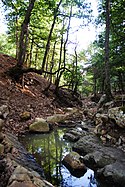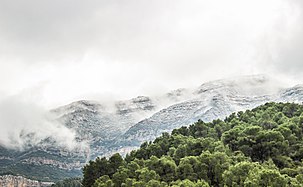North West Tunisia


North West Tunisia (
Geography
The North West region is located in the extreme north of the country, bounded to the west by the
The region is divided in half by the Medjerda River which is the longest river in the country. The North West is characterized by its unique forests and mountains (the Kroumirie and Mogod Mountains), coral coasts and the large plains.
-
Tabarka Coast
-
A small lake in Ain Drahem
-
A mountain in Nefza
National parks
There are three national parks located wholly or partly in the North West: El Feidja National Park in Jendouba, Jebel Serj National Park shared between Siliana and Kairouan and the Jebel Chitana-Cap Négro National Park divided between Béja and Bizerte.
- National parks of North West Tunisia
-
Jebel Chitana-Cap Négro National Park
-
Jebel Chitana-Cap Négro National Park
-
El Feidja National Park
-
Jebel Serj National Park
Demographics
With 1,170,752[1] people, the North West is the 5th-most populous region in the country. In decreasing order of population, the North West consists of the following governorates:
| Governorate | Population (2014) | Population Density | Largest town/city |
|---|---|---|---|
| Jendouba | 401,477 | 130/km² | Jendouba (113,116) (2014 est.) |
| Béja | 303,032 | 81/km² | Béja (109,299) |
El Kef |
243,156 | 49/km² | El Kef (73,706) |
| Siliana | 223,087 | 48/km² | Siliana (59,140) |
The region is characterized by its ruralness. In 2004 only 37,1% live in the cities (compared to 64,9% nationwide).[2] This can be explained by the dominance of the agricultural sector in the region's economy. The region is also marked by its negative net migration of -45,300 between 1999 and 2004.[3]
Cities and towns
Despite its ruralness, there are several cities and towns in North West Tunisia:

Population over 100,000
Population over 50,000
Population over 40,000
Population over 20,000
Population over 10,000
Social deprivation
For a long time, the North West has been one of the poorest regions in Tunisia; it registers of the highest rates of poverty, unemployment and illiteracy in the country.
References
- ^ a b (in French) Census 2014 (National Institute of Statistics) Archived 2014-10-29 at the Wayback Machine
- ^ "Archived copy". Archived from the original on 2015-09-24. Retrieved 2015-08-16.
{{cite web}}: CS1 maint: archived copy as title (link) - ^ "Statistiques Tunisie". احصائيات تونسية. Archived from the original on 8 July 2016. Retrieved 9 August 2018.








